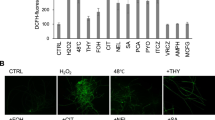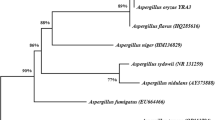Abstract
I HAVE already shown that the activity of peroxidase and catalase in rye is altered by ergot infection1. It seems to be very probable that this circumstance indicates formation of peroxide in the host-plant. The present communication deals with the effect of Hydrogen peroxide on germination of ergot conidia.
This is a preview of subscription content, access via your institution
Access options
Subscribe to this journal
Receive 51 print issues and online access
$199.00 per year
only $3.90 per issue
Buy this article
- Purchase on Springer Link
- Instant access to full article PDF
Prices may be subject to local taxes which are calculated during checkout
Similar content being viewed by others
References
Garay, A. St., Naturwiss., [42, 422 (1955)].
Hunter, G., Canad. J. Res., E, 27, 240 (1949). Hunter, G., et. al., ibid., 27, 230 (1949).
Kirchhoff, H., Z. Bakt., ii, 77, 310 (1929).
Author information
Authors and Affiliations
Rights and permissions
About this article
Cite this article
GARAY, A. Role of Ergothioneine and Catalase in Infection by Ergot Fungus (Claviceps purpurea Tul.). Nature 177, 91–92 (1956). https://doi.org/10.1038/177091b0
Issue Date:
DOI: https://doi.org/10.1038/177091b0
Comments
By submitting a comment you agree to abide by our Terms and Community Guidelines. If you find something abusive or that does not comply with our terms or guidelines please flag it as inappropriate.



